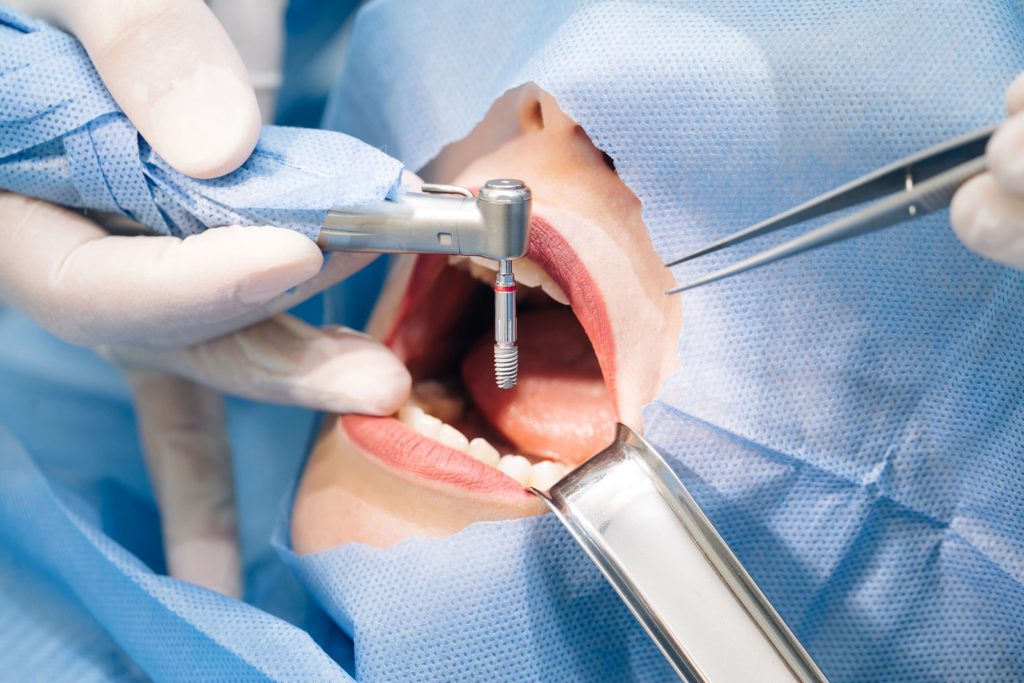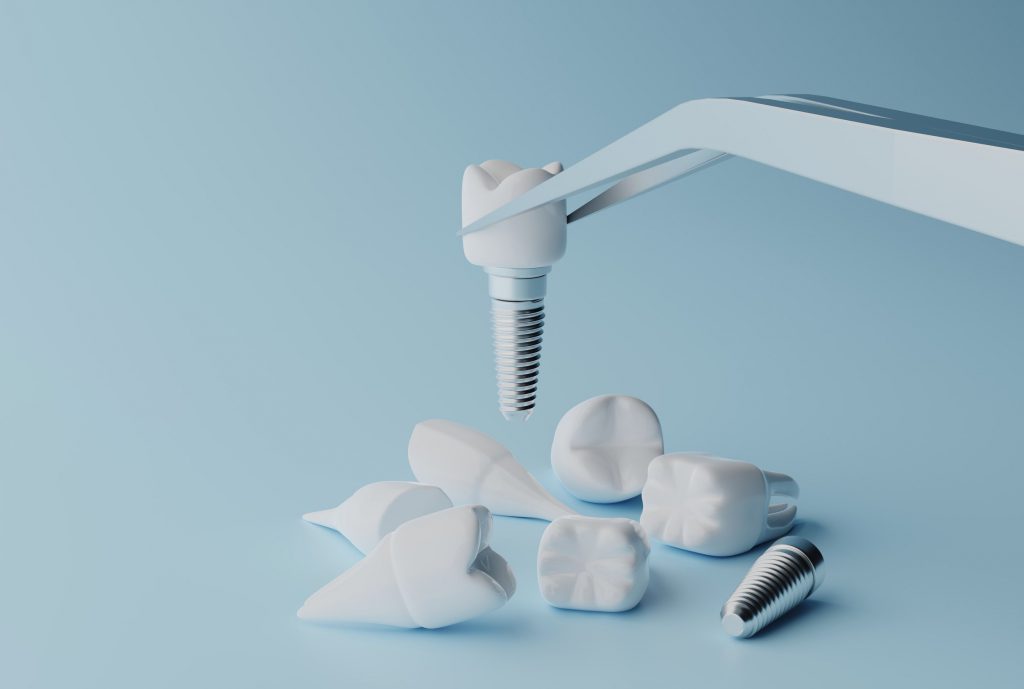You know how real the struggle is if you have been toothless for years or have been wearing removable dentures. Constant discomfort when eating, limited food choice, dreadful social interactions where people may notice your fake teeth have been slowly but steadily ruining your life.
Until you decide enough is enough, and start searching for long-term solutions to tooth loss – fixed teeth over implants. Dental implants are the masterpiece of tooth replacement. The non-removable pearly white bridges look and feel just like your natural teeth. You no longer need to worry about misplacing your teeth or limiting your food choices. They will improve your diet, and ensure you get all those nutrients your body needs to function properly, and with that, your overall health will take a positive turn as well.
Before taking such a major life-changing decision, we always aim to educate our patients and encourage them to learn more about dental implants so that they know what to expect. In this article, I will take you through dental implant surgery and recovery time. You can also read more practical tips on how to speed up the recovery time after dental treatment and what dental implant surgery recovery foods you should opt for and what solid foods to avoid after dental implant surgery.

Contents
Dental implant surgery
Your dental implantation will be scheduled once your dental implantologist has confirmed during the examination and scans that there are no health risks that may lead to complications during or after the teeth implantation. If you have pre-existing conditions such as high blood pressure or diabetes, you will be asked to make sure those are under control otherwise there would be a significant risk of implant failure. Furthermore, conditions some conditions may completely prevent you from having new teeth as the dental implant risks are too high.
Patients with Parkinson’s, for example, have an elevated risk of choking on saliva during dental implantation due to heavy saliva accumulation in the oral cavity. Patients with heart disease that have already damaged blood vessels need to report their medical history and list of medications to the dental implantologist so that they can do a thorough assessment of whether the dental implant risks are too high.
Each patient is required to undergo a thorough examination and scanning and to provide a detailed list of medications and medical history to ensure the dental implant procedure will have little to no chance of complications and implant failure.

What to expect after dental implant surgery
The good news about dental implant procedures is that it is completely pain-free. In every dental clinic, you are offered dental implant surgery anaesthesia which can be easily topped up if you feel that the local anaesthesia may be wearing off.
After the full dental implant surgery, it is a normal sensation to feel that you have an oversize object in your mouth. The reason for that is the tongue, lips, and inner side of the cheeks are very sensitive. It may not be an invasive procedure or painful procedure, but still, it is surgery, which means no ambitious plans or tasks for a few days – allow yourself to be pampered once for a change.
After the first 24 hours, any throbbing pain after dental implant surgery should start declining. You would notice some improvement, although this timeline is different for every person. The dental implant surgery recovery time is strictly individual and can take between 4 days and 4 weeks.
You should be prepared to have difficulties pronouncing some words. My advice would be to approach this with patience and kindness – don’t be too hard on yourself during this period – it will get better – I promise! Pro tip: Exercise oral speech to improve and you will get over the trouble of not speaking properly in no time.

Dental implant surgery recovery Dos and Don’ts
I can’t stress this enough – excellent oral hygiene is a must. We all know that poor oral hygiene leads to bacteria accumulation which can travel through the bloodstream and even damage other parts of your body. The last thing you want is problems with dental implants and the risk of implant failure due to inflammation.
Here is an easy 4-step process that you can follow to ensure optimal oral hygiene throughout your dental implant surgery recovery:
- Use a toothbrush (which can be electric) and non-abrasive toothpaste twice a day.
- Rinse with mouthwash once or twice a day.
- Use an electric water flosser such as Waterpik or another brand for better oral hygiene during the recovery period
- Clean with a small interdental brush under the bridge units
When using interdental brushes, you may place a small amount of toothpaste on them to clean better between the fixed bridge and the dental implants. Clean from the front to the back of the bridge, between the bridge and the gum line.
As a part of the dental implant recovery package, Dentaprime will provide you with a custom-made mouthguard. It is essential to use it every night. It will protect the restoration. In the morning, clean it with mouthwash and liquid soap and store it in a box.
Eventually, you’d need to replace it due to wear and tear. Important: Do not use store-bought mouthguards! Although they may be a cheaper option, they will never fit as well as the ones that have been specifically designed for you at the dental clinic. Furthermore, they can be very uncomfortable and can change shape easily due to poor quality. Not to mention, the risk of compromising breathing and speaking, and causing airway hazards.
Dental implant surgery recovery diet
Be careful while eating during the first week after the treatment. You will need to learn how to chew properly with your new teeth.
Try first with soft and liquidised meals and gradually switch to regular food. Top soft foods to ensure a speedy recovery:
- Soft chicken or fish
- Soup
- Mashed potatoes
- Bread (Pro tip: toast your bread for less pressure on the teeth and implants)
- Eggs
Generally, well-cooked legumes, eggs, fish and chicken are great soft food choices for post-surgery nutrition. Moreover, they are rich in protein which the body needs to speed up the implant recovery process. Still, if you can’t go without apples or nuts – do not bite but chop them into pieces before consuming.

You may wonder why we don’t recommend yoghurt, milk or cheese. We suggest that you hold off dairy for a while as it can cause inflammation. That way you would put the recovery at risk which is why we don’t recommend dairy products as a part of your diet after dental implant surgery.
Other foods to avoid after getting dental implants:
- Hard foods – crisps, taco shells, and nuts
- Sticky foods – hard candy and caramels
- Acidic foods – tomatoes and citrus
- Hot and spicy foods
Avoid any carbonated drinks, or any beverage containing acid or pulp for the first 24 hours following surgery. You should also abstain from having coffee the first couple of days after surgery since the gum is still healing otherwise you would increase the risk of a dry socket.
Bringing it all together
Despite looking invasive and scary dental implant surgery can be a smooth and stressless procedure if you do your due diligence beforehand. If you suffer from acute dental anxiety, make sure you talk to your dentist beforehand. The dental implantologist is the one who has to put you at ease and make you feel comfortable enough to share your thoughts and concerns. Finding the right dentist will make all the difference and will help you go through this major life change without fear. Once you have a clear understanding of the dental surgery process, related risks to dental implants, recovery and aftercare you will be prepared enough to take the next step towards your improved oral and overall health.


